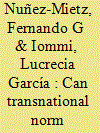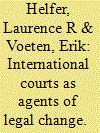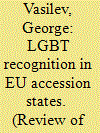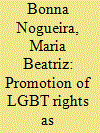| Srl | Item |
| 1 |
ID:
153925


|
|
|
|
|
| Summary/Abstract |
Norm cascades often spark resistance from states under pressure to conform. Some react by further distancing themselves from the norm—a process known as “norm backlash.” We identify a particular kind of norm backlash: the creation of legal barriers aimed at fending off a transnationally diffusing norm by blocking the ability of local actors to advocate for it. We call this phenomenon “norm immunization” and provide an account of the conditions that bring it about. In this account, transnational advocacy increases the local salience of the norm, which is discursively constructed as a national threat that calls for defensive regulations against the advocacy of the threatening norm. Using this model, we analyze Uganda’s immunization against LGBT rights as instantiated in the Anti-Homosexuality Act of 2014. We find that the successful efforts of LGBT rights advocates elsewhere indeed precipitated the discursive construction of those rights as a national threat in Uganda, thereby unintentionally contributing to the adoption of the norm-immunizing law.
|
|
|
|
|
|
|
|
|
|
|
|
|
|
|
|
| 2 |
ID:
131486


|
|
|
|
|
| Publication |
2014.
|
| Summary/Abstract |
Do international court judgments influence the behavior of actors other than the parties to a dispute? Are international courts agents of policy change or do their judgments merely reflect evolving social and political trends? We develop a theory that specifies the conditions under which international courts can use their interpretive discretion to have system-wide effects. We examine the theory in the context of European Court of Human Rights (ECtHR) rulings on lesbian, gay, bisexual, and transgender (LGBT) issues by creating a new data set that matches these rulings with laws in all Council of Europe (CoE) member states. We also collect data on LGBT policies unaffected by ECtHR judgments to control for the confounding effect of evolving trends in national policies. We find that ECtHR judgments against one country substantially increase the probability of national-level policy change across Europe. The marginal effects of the judgments are especially high where public acceptance of sexual minorities is low, but where national courts can rely on ECtHR precedents to invalidate domestic laws or where the government in power is not ideologically opposed to LGBT equality. We conclude by exploring the implications of our findings for other international courts.
|
|
|
|
|
|
|
|
|
|
|
|
|
|
|
|
| 3 |
ID:
148132


|
|
|
|
|
| Summary/Abstract |
In the EU accession literature, there is a tendency to downplay the role of discourse in facilitating norm diffusion, particularly when domestic resistance towards European norms is strong. The assumptions in this thinking are that critical deliberations and civil society activism simply lack the potency required to elicit norm conforming behaviour in accession states and that the only realistic hope for achieving this rests with the introduction of material incentives that make the costs of normative adaptation lower than its rewards. I focus on developments in the field of LGBT politics to challenge these assumptions and to specify the conditions under which discursive strategies are likely to stimulate the domestic uptake of contentious norms. I highlight shared identity as a crucial factor in the success of discursive influence, contending that under conditions of identity convergence, a cultural environment prevails in which norm promoters can more effectively ignite a process of deliberative reflection, shame norm-violators into conformance and cultivate resonance around controversial ideas. I develop these arguments through an analysis of LGBT and accession politics in Croatia and Serbia, contending that Croatia’s strong identification with Europe accelerated LGBT recognition there while Serbia’s relatively weaker identification with Europe slowed it down.
|
|
|
|
|
|
|
|
|
|
|
|
|
|
|
|
| 4 |
ID:
156234


|
|
|
|
|
| Summary/Abstract |
One of the greatest contemporary challenges in human rights norm making is defining the protection against discrimination based on sexual orientation, gender identity, and gender expression as an international standard. In an unusually polarized structure, the approval of a few resolutions on the rights of lesbian, gay, bisexual, transvestite, transsexual, and transgender persons has engendered intense negotiation within international organizations, which has been largely promoted by Brazil. By expanding the analytical parameters of the literature on norm entrepreneurship to the study of foreign policy, the article analyzes Brazil's international leadership on LGBT rights, explaining the origins, motivations, and results of the country's proactive stance on the issue.
|
|
|
|
|
|
|
|
|
|
|
|
|
|
|
|